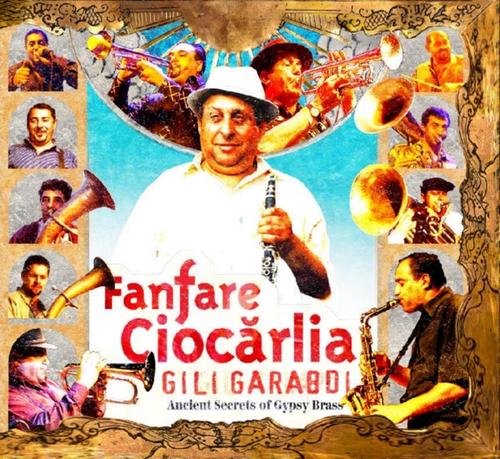
Traditional dances and Balkan tunes from Romania and rhythms from Turkey, Bulgaria and North Macedonia are played on horns, trumpets and clarinets.
“We are magicians of music and in Zece Prajini the ancient secrets of Gypsy magic live.” (Ioan Ivancea) When the enslavement of Romania´s Gypsies officially ended in 1864 tens of thousands fled the nation for new horizons. Several thousand landed in the United States, often settling in the black ghettoes of the Southern US states, where they continued to make music. Ioan, Fanfare Ciocarlia´s oldest member and group historian, once answered when asked if jazz was a big influence on the Fanfare, "Who´s to say our cousins who went to the US didn´t help invent jazz?" On Ancient Secrets this matter and other mysteries of Gypsy magic are set forth... Ioan, Fanfare Ciocărlia´s oldest member and group historian, once answered when asked if jazz was a big influence on the Fanfare, "Who´s to say our cousins who went to the US didn´t help invent jazz? " On the new CD "GILI GARABDI" this matter and other mysteries of Gypsy magic are set forth. The CD will be released by Asphalt Tango Records on March 7th 2005. Zece Prajini (literally meaning 'ten fields') is a village of just four hundred souls, surrounded by gentle mountains and dusty tracks. Situated in the East of Romania, it is no more than a stone's throw from the border with the former Soviet republic of Moldavia. This area of Romania is known for its rugged seclusion and the stubborn poetry of its inhabitants. In the evenings, when the winds calm down, the sounds of the fanfare echo from the surrounding slopes. This is the home of the twelve Romany Gypsy musicians who make up the FANFARE CIOCARLIA brass ensemble. The art of playing music has been handed down from generation to generation since time immemorial. There is no sheet music. The instruments, bearing the marks of the previous decades, have lost their shine and gained their own patina. On them FANFARE CIOCARLIA manage to set off a musical firework display, with an unbelievable talent for intricate rhythms and dizzy tempos. Traditional dances from Romania and rhythms from Turkey, Bulgaria and Macedonia are played on horns, trumpets, clarinets and timpani. For each different moment in life there is an appropriate piece: geamparale, sîrba, hora, and if the mood requires, a racy ruseasca at the end.
Share via:
